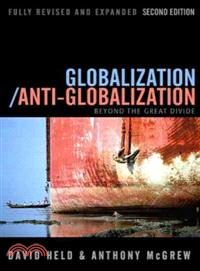Is globalization being eclipsed by a resurgent geopolitics? Does the war on terror denote the end of globalization or a new phase of militarized globalization? Empire or globalization, which better describes the current global condition? The second edition of this successful book tests the claims of those who dismiss the continuing significance of globalization through a comprehensive assessment of contemporary global trends. In the aftermath of September 11th, and the war in Iraq, there has been much talk of the end of globalization. Held and McGrew argue that these post-mortems for globalization are entirely premature. They focus upon the primary structures of world order namely: patterns of governance, organized violence, and cultural, ecological and economic exchange with particular emphasis given to global patterns of inequality, exclusion and domination. Building upon this analysis, the authors present the case for continuing to take globalization seriously as both a description and explanation of our current global condition. Globalization continues to provoke intense controversy and conflict as it resurrects, albeit in a new context, one of the fundamental questions of political life namely: who rules, in whose interests, to what ends, and by what means? They also ask the vital question: can globalization be tamed? Moreover, they explore whether a more just and stable world order is either desirable or feasible and present an alternative ethical and political agenda for the twenty-first century - a global covenant of cosmopolitan social democracy. This illuminating book will appeal to all those who remain intrigued, confused or simply baffled by thecontroversy about globalization and its consequences for the twenty first century world order.
| FindBook |
有 2 項符合
Globalization/Antiglobalization的圖書 |
 |
Globalization/Anti-Globalization 2E 作者:Held,David/McGrew,Anthony 出版社:John Wiley & Sons Inc 出版日期:2007-11-28 語言:英文 規格:平裝 / 15.9 x 22.9 x 2.5 cm / 普通級/ 再版 |
| 圖書館借閱 |
| 國家圖書館 | 全國圖書書目資訊網 | 國立公共資訊圖書館 | 電子書服務平台 | MetaCat 跨館整合查詢 |
| 臺北市立圖書館 | 新北市立圖書館 | 基隆市公共圖書館 | 桃園市立圖書館 | 新竹縣公共圖書館 |
| 苗栗縣立圖書館 | 臺中市立圖書館 | 彰化縣公共圖書館 | 南投縣文化局 | 雲林縣公共圖書館 |
| 嘉義縣圖書館 | 臺南市立圖書館 | 高雄市立圖書館 | 屏東縣公共圖書館 | 宜蘭縣公共圖書館 |
| 花蓮縣文化局 | 臺東縣文化處 |
|
|
圖書介紹 - 資料來源:博客來 評分:
圖書名稱:Globalization/Antiglobalization
|











